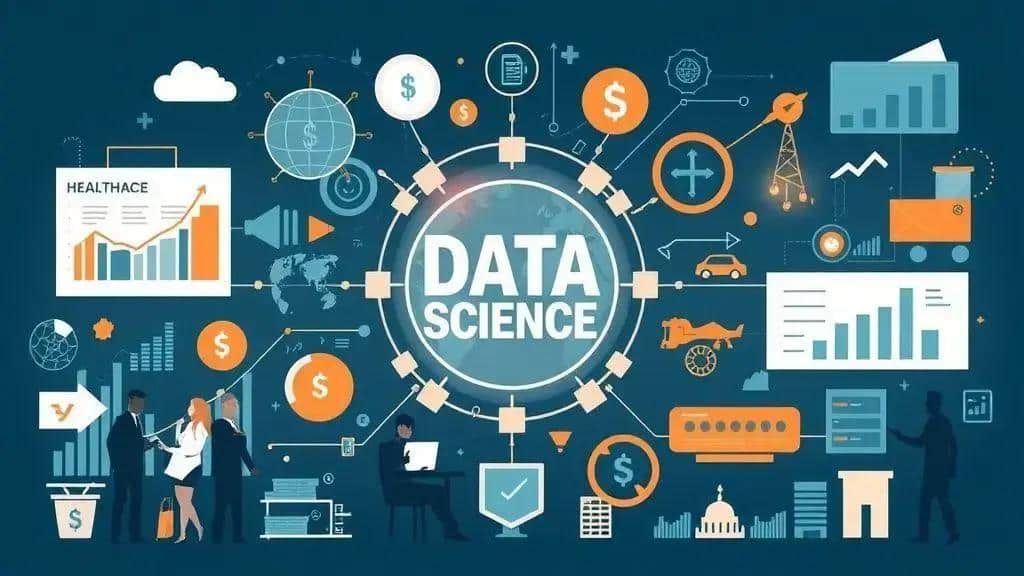Enhanced knowledge for data science: unlock your potential

Data science applies statistical analysis, machine learning, and data management techniques to enhance decision-making across various industries, including healthcare, finance, retail, and logistics.
Enhanced knowledge for data science is crucial in today’s data-driven world. Have you ever wondered how companies leverage data to make decisions? In this article, we will delve into essential concepts and resources needed to boost your skills.
Understanding the fundamentals of data science
Data science is a vast field that combines various techniques and tools to extract insights from data. Understanding the fundamentals of data science is crucial for anyone looking to pursue a career in this area. It encompasses a variety of disciplines including statistics, computer science, and data analysis.
Key Components of Data Science
At its core, data science involves analyzing data to uncover patterns and make informed decisions. The main components include:
- Data Collection: Gathering information from various sources.
- Data Cleaning: Ensuring data accuracy and consistency.
- Data Analysis: Interpreting data to find trends and correlations.
- Data Visualization: Presenting findings in an understandable format.
Another important aspect is understanding different data types. Data can be structured, semi-structured, or unstructured. Each type requires a different analysis approach. Structured data fits neatly into tables, while unstructured data like emails, videos, and images can be more challenging to analyze.
The Role of Statistics
Statistics plays a vital role in data science. It provides the methods needed to draw conclusions from data samples. Data scientists use statistical tests to make predictions about larger populations.
On the other hand, programming languages like Python and R are essential for handling complex algorithms. These tools allow data scientists to manipulate data efficiently and implement machine learning models.
Ultimately, being proficient in data science means staying updated with the latest tools and technologies. Continuous learning is necessary, as the field is constantly evolving with new techniques emerging regularly. By grasping the fundamentals, you set yourself up for success in this exciting industry.
Key tools and technologies in data science

In the world of data science, having the right tools and technologies is essential for success. Numerous resources are available to help you analyze data and derive meaningful insights. Familiarizing yourself with these key tools and technologies in data science can significantly enhance your skills.
Popular Programming Languages
One of the first steps is choosing a programming language. Python and R are the most popular languages in data science. Python is known for its simplicity, making it a great choice for beginners. R, on the other hand, excels in statistical analysis and visualization.
Both languages offer extensive libraries to assist in various tasks. For instance, libraries like Pandas and NumPy in Python allow for efficient data manipulation, while ggplot2 in R is excellent for creating stunning visualizations.
Data Visualization Tools
Effective data visualization is crucial for communicating findings. Tools like Tableau and Power BI are widely used in the industry. They enable users to create interactive and shareable dashboards.
- Tableau: A user-friendly tool favored for its drag-and-drop interface.
- Power BI: Integrates well with Microsoft products, making it a common choice for businesses.
- Matplotlib: A Python library for creating static visualizations.
Understanding these visualization tools helps data scientists present their work clearly and persuasively. Another vital component is data management tools, which help organize and store data efficiently.
Machine Learning Frameworks
Machine learning is another critical area of data science. Frameworks like TensorFlow and Scikit-learn are popular for building models. TensorFlow, created by Google, supports large-scale machine learning and has extensive documentation.
Scikit-learn, on the other hand, is ideal for beginners as it offers simple, efficient tools for data mining and analysis. Knowing how to leverage these frameworks can boost your capabilities in predictive analytics.
Overall, mastering these key tools and technologies in data science is vital for anyone aspiring to be a successful data scientist. Regular practice and staying updated with the latest advancements ensure continued growth in this ever-evolving field.
Effective strategies for learning data science
Learning data science can be an exciting journey, but it requires effective strategies to succeed. Having the right approach can make understanding complex concepts much easier. By following some effective strategies for learning data science, you can enhance your skills and knowledge.
Start with the Basics
Begin by getting a solid grasp of foundational topics. Understanding statistics and mathematics is essential, as they form the basis of data analysis. Familiarize yourself with key concepts like probability, descriptive statistics, and inferential statistics.
- Online Courses: Platforms like Coursera and edX offer excellent courses tailored for beginners.
- Books: Consider reading “Data Science for Dummies” or similar titles to build your knowledge.
- Practice: Use tools like Excel to refine your basic analytical skills.
Next, explore programming languages such as Python or R. These languages provide powerful libraries and frameworks for data analysis and machine learning. Start with simple projects to apply what you learn and build confidence.
Engage in Hands-On Projects
One of the best ways to deepen your understanding of data science is through hands-on projects. Working on real-life datasets can help reinforce concepts and build practical skills. Websites like Kaggle provide numerous datasets and competitions to practice.
You can find projects ranging from data visualization to building machine learning models. Completing these projects showcases your skills and equips you with valuable experience. Collaborating with peers on projects also enhances learning through sharing ideas and strategies.
Join a Community
Being part of a data science community can significantly aid your learning process. Online forums like Stack Overflow and Reddit feature discussions that can broaden your knowledge. Participate in local meetups or workshops to network with fellow enthusiasts.
Mentorship can also play a critical role. Seek out professionals in the field who can guide you or provide insights. Learning from others’ experiences can help you avoid common pitfalls and accelerate your growth.
Lastly, remember to stay curious and open-minded. The field of data science is rapidly evolving, with new tools and techniques emerging regularly. Continuous learning and adaptation are vital in staying relevant. Therefore, adopting these effective strategies will empower you on your journey to mastering data science.
Real-world applications of data science

Data science plays a crucial role in various industries and has many real-world applications that shape our everyday lives. Understanding these applications can highlight the importance of data science in making informed decisions and solving complex problems.
Healthcare Innovations
One significant application of data science is in the healthcare sector. It helps in predictive analytics for patient care, allowing medical professionals to anticipate health issues. By analyzing patient data, doctors can identify trends that lead to better treatment plans and outcomes.
- Personalized Medicine: Tailoring treatment plans based on patient data.
- Predictive Modeling: Forecasting disease outbreaks using historical data.
- Drug Development: Utilizing data to speed up the research and testing phases.
These innovations have led to improved patient care and more efficient healthcare systems. As a result, healthcare providers can deliver targeted therapies and save lives.
Finance and Risk Management
Another critical area where data science is applied is in finance. Financial institutions use complex algorithms and data analysis to make investment decisions and assess risks. Data-driven insights enable banks and investment firms to identify market trends and anomalies.
By analyzing financial data, companies can minimize risks, enhance their trading strategies, and maximize returns. This reliance on data science helps prevent fraud and ensure regulatory compliance.
Retail and E-commerce
The retail sector also benefits significantly from data science. Retailers analyze customer behavior and purchase patterns to optimize inventory and increase sales. This data-driven approach allows businesses to personalize marketing strategies and improve customer experiences.
- Recommendation Systems: Suggesting products based on customer preferences.
- Inventory Management: Optimizing stock levels using predictive analytics.
- Customer Segmentation: Dividing customers into groups for targeted marketing.
By leveraging these real-world applications, businesses can enhance their decision-making processes and cater to the needs of their customers effectively.
Transportation and Logistics
In the transportation sector, data science is transforming how goods and people move. Companies use data analysis to optimize routes, reduce fuel consumption, and improve delivery times. For example, ride-sharing services analyze traffic data to match drivers with passengers more efficiently.
Logistics companies apply data science to streamline their supply chain operations. By maintaining real-time data on shipments and deliveries, they can enhance operational efficiency and customer satisfaction. This application significantly impacts cost reduction and resource management in the industry.
FAQ – Frequently Asked Questions about Data Science Applications
How does data science improve healthcare outcomes?
Data science enhances healthcare by predicting patient conditions, allowing for timely treatments and personalized care plans.
What role does data science play in finance?
Data science helps financial institutions analyze risks, detect fraud, and make informed investment decisions.
How can retailers benefit from data science?
Retailers use data science to understand customer behavior, optimize inventory, and personalize marketing strategies.
What are some examples of data science in logistics?
In logistics, data science streamlines supply chain operations, improves route planning, and enhances delivery efficiency.





